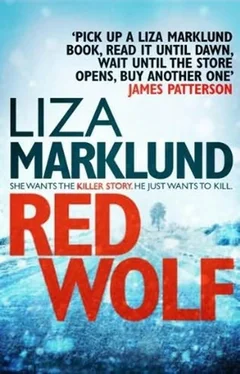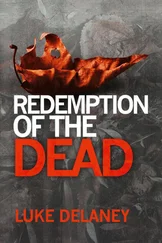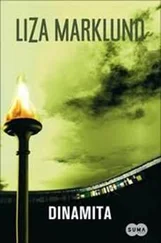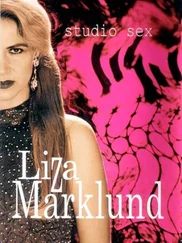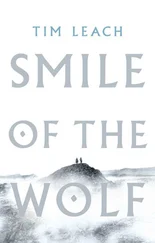Annika searched for a pen.
‘Where does she live?’
‘Do you think he could have been murdered? What do you think they’ll do to the project? Are they likely to shut us down? If they think we contributed in any way-’
‘Where does the woman live?’
He fell silent; a surprised sullenness hit her ear.
‘Huh?’
She bit her pen, hesitated and rattled it against her teeth.
‘That sounds a bit shallow,’ she said. ‘A man is dead and you’re worrying about your job.’
His reply came quick as a flash. ‘And what do you do whenever there’s a murder? All you do is moan about your bosses and your miserable colleagues.’
She held the pen still, then put it down on the desk, and there was a faint click in her left ear. She wondered if he had hung up on her.
‘Outside Östhammar,’ he said; ‘a little village in northern Uppland. They’re farmers. I don’t know how late I’m going to be – it depends on what we decide, and naturally on what the police say.’
She left his sense of grievance well alone.
‘Have you spoken to the police?’
‘To begin with they thought it was suicide, but as the wife objected they’re looking into it more closely.’
Annika put her feet back up on the desk.
‘Even if the man was killed,’ she said, ‘it doesn’t necessarily mean he was shot because he was a politician, if you get what I mean. He may have had debts, addictions, rejected children, mad neighbours, anything.’
‘I know,’ Thomas said curtly. ‘Don’t wait up.’
‘By the way,’ Annika said to the curtains, ‘what’s her name?’
A short, buzzing silence.
‘Who?’
‘The woman, of course; the wife who called you.’
‘I don’t want you getting involved with this.’
They had a silent stand-off, until Annika capitulated. ‘Your job isn’t on the line,’ she said. ‘If he was murdered then your project only becomes more important. If anyone’s going to end up in the shit it’s the politicians, because they should have started your work much earlier. With a bit of luck you can stop this sort of thing happening again.’
‘You reckon?’
‘You’re not the bad guys this time, trust me. Mind you, it might be helpful if it was me who wrote the article.’
Thomas was silent for several seconds, Annika could hear him breathing.
‘Gunnel Sandström,’ he said eventually. ‘The husband’s name was Kurt.’
Thomas hung up, beads of sweat on his brow. He had been on the brink of giving himself away.
When Annika had asked ‘her’ name, he had Sophia Grenborg’s name on the tip of his tongue; her shiny hair and smiling eyes, the sound of her heels clicking in his ears, her perfume in the room with him.
That was close , he thought in a muddled way without really realizing what had been close, merely aware that something had gone up in flames, something had happened, a process had started which he didn’t know if he could handle, but he still couldn’t stop.
Sophia Grenborg, with her apartment on Östermalm, in her family’s building.
His mother would like her; the thought ran through his head. She was actually not dissimilar to Eleonor. Not in appearance – Eleonor was tall and sinewy, Sophia was short and petite – but they had something else in common, an attitude, a seriousness, something deeply attractive that Annika didn’t have. He had once overheard Annika describing Eleonor as the sort of person you don’t mind having in your home, and there was something in that. Eleonor and Sophia moved effortlessly through office corridors and meeting rooms, glamorous salons and international hotel bars. Annika just got clumsy in situations like that, her clothes more dishevelled than usual, looking incredibly uncomfortable in her own skin. Whenever they went anywhere she just wanted to talk to the locals and eat in the bars where the locals ate, and wasn’t remotely interested in culture or the exclusive hotel pool.
He cleared his throat a couple of times, then picked up the phone and dialled Sophia’s direct line at the Federation of County Councils.
‘It’s fine,’ he said. ‘I’d love to come to the jazz club after the meeting.’
Annika picked one of the newspaper’s courtesy cars that had studded tyres, expecting ice on the narrow lanes of northern Uppland. The radio was tuned to one of the commercial stations.
In quarter of an hour she had crept seven hundred metres along the jam-packed Essinge motorway, and angrily retuned from the adrenalin-thumping pop music to P2. The news in Serbo-Croat turned into news in Arabic, then something she guessed might have been Somali. She listened to the rhythm of the foreign languages, searching for words she recognized, picking up the names of places, countries, a president.
The traffic started to move after the Järva junction, and once she had passed Arlanda Airport it thinned out considerably. She put her foot down all the way to Uppsala, then turned off right towards Östhammar.
The agricultural landscape of Roslagen spread out around her, dark-brown soil in frostbitten furrows, islands of buildings, rust-red painted farmhouses and white-plastered barns. Communities she didn’t even know existed flew by, places with schools and supermarkets and health centres in obscurity, hotdog kiosks with curtains with abstract designs from IKEA, the occasional Christmas garland. The grey light erased the sharpness of her surroundings, and she switched on the windscreen wipers.
The road was gradually becoming narrower and more twisted the further north she got. She got stuck behind a local bus that stuck to sixty kilometres an hour, at best, for more than ten kilometres before she had a chance to overtake, and had to force herself not to get stressed. Half the point of this trip was to get out of the office. She had pulled the directions Gunnel Sandström had given her out of her bag while she was stuck behind the bus.
Over the roundabout, towards Gävle, seven kilometres north, then a red farmhouse on the right with an old wagon in the drive and a garden gnome on the veranda. Perfectly straightforward, but she still almost missed the turning and had to brake sharply, realizing that the roads really were slippery. She pulled in behind the wagon, leaving the engine on for a few moments as she looked up at the farmhouse.
The large main house was on the right, with new cladding, but the window frames needed painting. A fairly new stained-wood veranda, a little white china lamp and four small African violets in the kitchen window. On the left an office and silo, stables and workshops, a heap of manure and some pieces of agricultural machinery that evidently hadn’t been used for some time.
A proper old farm , she thought, efficiently but not pedantically run, traditional but not sentimental.
She switched off the engine and caught a glimpse of the woman as a shadow in the kitchen. Taking her bag, she walked up to the house.
‘Come in,’ Gunnel Sandström said in a thin voice. Puffy eyes. Annika took her dry little hand.
She was about fifty, short and fairly plump, radiating that sort of vanity-free self-confidence. Short grey hair, a wine-red belted cardigan.
‘I’m so sorry for your loss,’ Annika said, thinking the phrase sounded clumsy and feeble, but the woman’s shoulders drooped slightly, so the words seemed to have hit their mark.
‘Please, take your coat off. Can I offer you some coffee?’
Annika could still taste the cold coffee from the machine in her mouth, but said yes anyway. She hung up her coat and pulled off her outdoor shoes. The woman was acting on reflex, following patterns of behaviour ingrained over decades. In this house visitors were offered coffee, no matter what. Gunnel went to the stove and turned on the fast plate, measured four cups of water into the pot, then four spoons of roasted ground coffee from the green and pink tin next to the spice-rack, then rested her right hand on the handle, ready to pull the pot off the heat when it came to the boil.
Читать дальше
